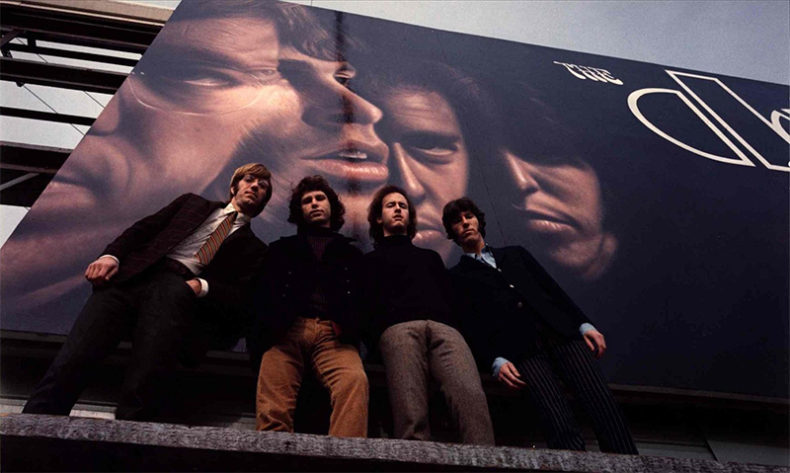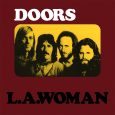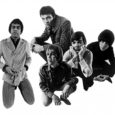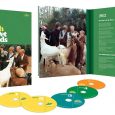THE DOORS – 50th ANNIVERSARY
The story of The Doors is almost as mystical as their music. It is one of fate and legend. It begins on Venice Beach in the summer 1965.
UCLA film graduate, Ray Manzerek, is contemplating his future whilst sitting crossed legged on warm Los Angeles sand. Soon he sees a thin, figure emerge from the water. He recognizes this person. As the figure comes closer it is clear to Manzerek that this is Jim Morrison, a fellow UCLA classmate. Manzerek waves Morrison over.
As Morrison drifts over, Manzerek notices the drastic change in his appearance. He has lost nearly 30 LBs, and his hair has grown out to his shoulders.
Manzerek is surprised to see Morrison, as he was under the impression that he was in New York City. Morrison says he decided to stay in Venice. He feels something happening here. He also tells Manzerek he’s writing songs.
Manzerek, a classically trained pianist, becomes very interested. He asks Morrison if he can hear one of his songs. At first, the timid Morrison declines, but eventually relents. He sits down on the sand in front of his old classmate, shuts his eyes and clenches his fists. He begins to sing the opening lines of “Moonlight Drive” in a quiet, shy voice.
After he finishes, Manzerek flips out and immediately says that they have to get a band together.
“That’s exactly what I was thinking,” Morrison replied. “And I’ve got the perfect name. The Doors.”
“Just the Doors?” Manzerek inquires.
“Just the Doors, man.”

The Doors Album Cover
Morrison had, of course, taken the name from the 1954 book The Doors of Perception by Aldous Huxley. The book had recently become popular amongst hallucinogenic drug users and college hipsters, both of which Morrison was. Huxley had borrowed the phrase from Romantic poet William Blake, who penned the phrase, “If the doors of perception were cleansed, everything would appear to man as it is, infinite.” Both writers would have a great influence on Morrison, especially Blake. Morrison would later his poetry in future Doors songs.
Immediately after their meeting, Morrison moved in with Manzerek and his girlfriend. Soon after Manzerek called in two of his brothers, Rick and Jim, to join the Doors. Both had experience playing in a surf band, Rick & the Ravens. Manzerek also asked Jazz drummer, John Densmore, whom he knew from a meditation class to join. The five musicians started jamming at the Manzerek beach house for the rest of the summer honing their material.
At first Densmore didn’t think much of their singer. He felt he was too shy to be a compelling front man. He didn’t think he had much of a voice either, but after listening to his lyrics, which were far more literary than they were rock and roll, he changed his mind.
After the band was confident with the material they went into Aura Studios in September 1965 and recorded a six-song demo. Their versions of “Hello, I Love You”, “Moonlight Drive” and “My Eyes Have Seen You” are raw, bluesy and primitive. Manzerek’s electric organ is nowhere to be found, instead he is playing a piano and Morrison had yet to develop his characteristic growl. On these demos he sounds young, inexperienced and reserved.
After the acetate demo has been pressed, Manzerek and Morrison would take it around to local record labels, but most of them passed on it. Sometimes without even listening to the demo, they would just take a look at the barefoot Morrison and turn them away. After months without finding a contract, Rick and Jim Manzerek leave the band, figuring it was going nowhere. Densmore decides to bring in flamenco guitarist, Robby Kreiger, who had only been playing electric guitar for six-months. This would be the final lineup for the Doors.
Soon after Krieger joined the group, Billy James discovered the band and brought their demo to Columbia Records who then offered them a six-month deal in which a single needed to be produced. James started the band off with free equipment, giving Kreiger a Vox guitar amplifier and Manzerek a Vox Continental electric organ, which would become his signature, carnival-esque sound. Soon after he would find a Fender Rhodes Piano Bass, which he would play simultaneously, making up for the bands lack of a bass player.
After three-months of waiting the Doors had yet to hear anything and wondered when they would record. James took them to several producers including Terry Melcher and Bruce Johnston but none were interested in recording the group. The Doors decided to leave Columbia before their contract was up. This meant that they would not receive any money.

The Doors at their rehearsal studio – Venice Beach, 1966
Now the Doors needed to find a gig in order to support themselves. The “it” place to play in 1966 Los Angeles was The Whisky A Go-Go. That’s where the big Los Angeles acts like the Byrds, Buffalo Springfield and Love played. However, since the Doors were not yet in the caliber of these bands, they settled for a dive club, the London Fog, which was down the street from the Whisky.
The London Fog was not a moneymaker. Often the place would be empty and the band would play to an audience of three or four drunks a night. However, what the place lacked in energy it made up for by giving the Doors plenty of time to work on their songs. Having no audience made it okay for the band to play extended solos and for Morrison to adlib spoken word poetry. Slowly the shy, lead singer was coming out of his shell. At first he sang with his back to the audience, but after a few months he was steadily becoming the charismatic Lizard King.
When the Doors were asked to become the house band, they were expected to play a minimum of four sets per night. Realizing they didn’t have enough original material, Morrison, who had been the sole lyricist up to that point, asked the other three Doors to write a song. Only Krieger took heed. When he met with his band members a few days later, he played them his first composition: “Light My Fire”.
Densmore immediately began to play a Latin beat behind it, while Manzerek came up with a John Coltrane inspired intro. Finally, Morrison added the second verse about the “funeral pyre”. The result: one of the best damn songs of all time.
After three months of playing at the dingy London Fog the band was fired when Jim urged two drunks in the audience to begin fighting. Two weeks later they got their first gig at the Whisky.
“What we hoped for,” said Krieger. “Was that word would leak over to the Whisky that ‘Hey, there’s this cool band over at the London Fog’ and that maybe we would get in there and that’s exactly what happened.”
By the time they started playing at the Whisky, the Doors had nearly three full-length albums of material that was well rehearsed, but still managed to have an experimental aspect to it.
A few months later, the Love front man, Arthur Lee spoke to Elektra Records founder Jac Holzman about the Doors.
“I had a very high opinion of Arthur’s opinion,” said Holzman. “So I stayed around and there I saw the Doors. And I wasn’t particularly impressed. I didn’t hear any of the iconic songs that evening, but I kept going back for four evenings. Now, the fourth evening I went everything just came together and you just knew.”
Holzman immediately offered the group a recording contract. The band was ecstatic to be signed to the hip Elektra label, which was home to popular artist like the Paul Butterfield Blues Band and Love.
Soon after, Morrison showed up late to a gig, stoned on acid and sang a new improvised sectioin in “The End”. Under his breath he kept repeating, “Kill the father, fuck the mother”. He closed his eyes and stepped up to the mic and improvised what would become the legendary Oedipal section. The lines about killing his father and fucking his mother offended the club owner so much he fired the band on the spot.

Live at the London Fog – West Hollywood, 1966
In August 1966 the Doors entered Sunset Sound recording studio in Hollywood where they would be working with engineer Bruce Botnik and producer Paul A. Rotchild. This brilliant team of switched on hipsters recorded the bands debut recording in just six-days.
When the group finished recording, they knew they had something unique on their hands. The Doors was unlike any other record of its time. It fused multiple genres like Proto-Punk (“Break on Through”), Funk (“Soul Kitchen”), Caberet (“Alabama Song”), Blues (“Back Door Man”), Latin-Jazz (“Light My Fire”) and Indian Raga (“The End”) all within their unique blend of Psychedelic Rock.
The band decided to lead off with “Break on Through” as their first single, releasing it on New Years Day, 1967. It was short, punchy and Morrison’s screams sounded like Frank Sinatra in a drunken rage, giving the general public a sample of what the band was all about. The Doors did everything they could to support the single by shooting a promotional video and appearing on Shebang, a Los Angeles’ take on American Bandstand. However, the single stalled at 126 on the Billboard charts.
The Doors, was released four days after their single and sold poorly at first, mainly being listened to by college kids. The album hadn’t quite caught on with the emerging counterculter movement.
Elektra soon began getting requests from local DJs to cut the seven-minute “Light My Fire” into an AM friendly single. At first the band relented, but eventually gave in. The single was released in May 1967 and unlike “Break on Through”, it was an instant smash, hitting the number one spot of the Billboard charts in July.
“In retrospect it’s seen now as a perfect song for that summer,” said rock critic, Ben Fong-Torres. “Things were beginning to glow and ignite and explode in terms of the social changes and political changes in the country.”
But the Doors stood out from the pack in that legendary summer. They may have had long hair, but they were by no means hippies. They didn’t come from the same scene that spawned the Grateful Dead or Jefferson Airplane. They weren’t singing about peace and love, instead reflecting the dark underbelly of America with Morrison’s hauntingly poetic verse. The lines “Lost in a Roman wilderness of pain, and the children are insane” from “The End” shows the singers’ views on the Love Generation as less than flattering.

Jim Morrison at Sunset Sound recording studio – Hollywood, 1966
To close off the legendary Summer of Love, that had spawned the fame of the Doors, the band appeared on The Ed Sullivan Show in September 1967. The popular variety show was where Elvis Presley, the Beatles, and the Rolling Stones had first reached mainstream American audiences. Now it was time for the Doors. But there was a catch. The band was politely asked to omit the word “higher” and replace it with “better”. The band agreed that they would. However, when show time came, Morrison ignored the producers’ request and sang, “Girl we couldn’t get much higher” anyway. The producers were outraged and told them they would never appear on the show again, but the Doors could have cared less. “We just did the Ed Sullivan Show,” Morrison replied.
The publicity surrounding the Doors, however, was mainly directed at their charismatic lead singer. Morrison’s good looks and engaging stage presence naturally helped to bring up album sales for the band. It’s fairly obvious why his face is much more upfront on the album cover than his band mates. By mid-1967, he had shed his beatnik pullovers and khakis for chic white linen shirts, leather pants and concho belts. The Lizard King had arrived. But Morrison soon became uncomfortable with the idea of being a sex symbol and did everything in his power to change it. He desperately wanted to be taken seriously as a poet and soon began to resent being in the band.
By 1969 he began to increase his alcohol intake and gained weight. Morrison grew a heavy beard, resembling Rasputin more than a pop idol. Eventually his drinking lead to the bands, and later his, demise.
The Doors would go on to make five more albums after their eponymous debut with Jim Morrison before his death in 1971. Despite making critically acclaimed albums like Strange Days and L.A. Woman, the band would never again quite top their fusion of poetry, Jazz and Rock like they had on their debut recording.
It is currently ranked 42 on Rolling Stone’s 500 Greatest Albums of All Time. In 2007, it topped Rolling Stone’s list of 40 Essential Albums of 1967, ahead of classics like The Velvet Underground & Nico and Sgt. Pepper.

Publicity shot (clockwise from top left): Ray Manzerek, John Densmore, Jim Morrison, Robby Krieger, 1967
The Doors has come to symbolize the beginning of the counterculter movement and LSD culture that took America by storm in the late ‘60s. Still, the album goes much deeper than that; it contains the remarkable music of three brilliant musicians and their gifted singer at the peak of his powers.
And of course The Doors has an extremely philosophical aspect to it. Not twenty-seconds into the record is Morrison yelling, “Break on through, to the other side,” urging anyone who will listen to think for themselves and to become an individual. This nonconformist attitude stays with you throughout the album and, if you’re lucky enough, will stay with you for the rest of your life.
If you have your doors open, The Doors will not only cleanse them, it will blow them right off of their hinges.








